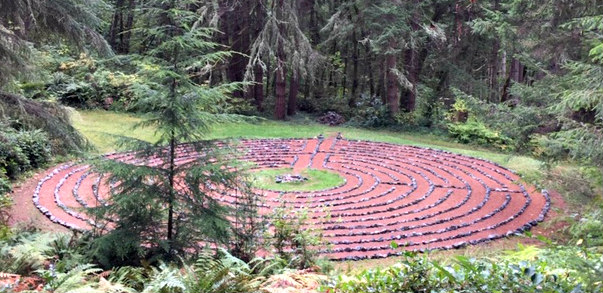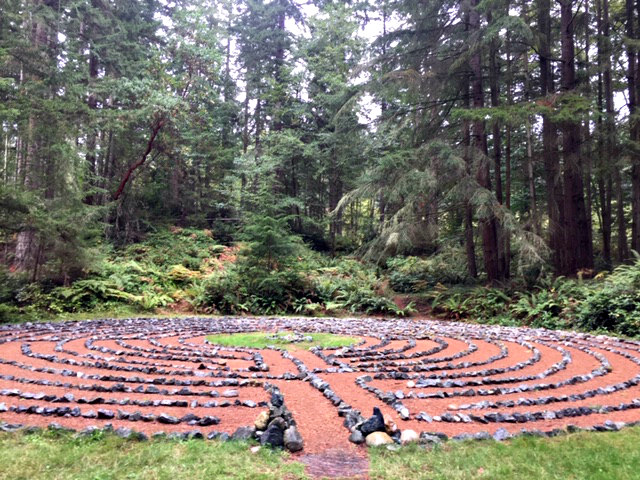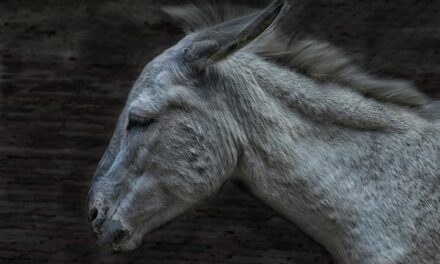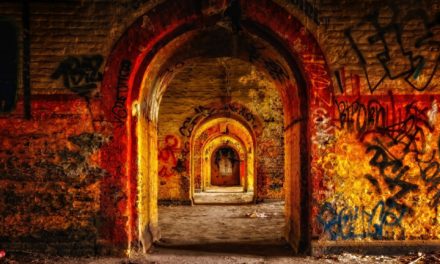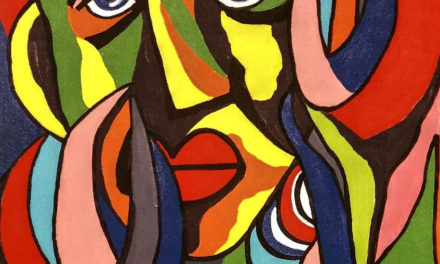I’m wary of labyrinths. Too trendy. Too arty. Too glib. Too one-size-fits-all spirit dressing. Protestant, Catholic, Jew, Muslim, Buddhist, Sufi, New Ager, Pagan, seeker, atheist, meditator, mystic, addict, recovering addict, hospital patient, nature enthusiast, experience collector, curiosity hound—come one, come all, the empty center beckons, waiting for you to fill it with meaning, a Rorschach test for the feet.
~~~
The way to the woods from my cabin leads past a labyrinth tucked in a forest meadow on the edge of the Chinook land at Whidbey Institute on Whidbey Island. Passing by, I can see why this labyrinth is a popular destination. It’s modeled on the famous thirteenth-century labyrinth inside Chartres Cathedral, eleven circuits divided into quadrants and surrounded by an outer ring. But this incarnation, neither ancient nor storied, offers what Chartres does not, spaciousness and the beauty of unadorned nature. At 86 feet in diameter, it’s far roomier, and more physically challenging, than its 42-foot French cousin. The single path that curves toward the grass and earthen center is defined by fist-sized, rough-cut, gray-green granite rocks and filled with fragrant cedar chips. And the whole is limned by the glorious greens and reds of the Pacific Northwest woods—alders, birches, Douglas firs, true firs, madronas, hemlocks, spruces, pines, and cedars rising above an understory of salal, ferns, mosses, nettles, huckleberry, osoberry, oceanspray, and red-osier dogwood. It’s beautiful. I’ll give it that. A shining jewel in a rare setting. But I’m not one for jewels. I’m on my way to hike in the lush forest beyond, explore the web of trails spanning 100 acres. Just passing by this lovely plot.
~~~
I don’t like labyrinths. I like wild, they’re tame. I like wilderness, they’re domesticated—like hiking trails in the Swiss mountains, meticulously groomed by government crews who arrive the second a tree falls, as soon as the snow stops, or immediately after a hay wagon turns over, to groom the landscape and clear the way. Labyrinths are so civilized, even outdoor labyrinths like the one I’m walking past—nature with the stench of humanity all over it. No, that’s not for me. That does not soothe my soul. The deep woods, the company of ancients, trees hundreds of years old, never felled or pruned by human hands—that’s where I’m headed. Just a few strides away, a narrow, overgrown footpath leads into the old growth forest. Almost there.
~~~
Passing the entrance to the labyrinth, I hesitate. Two large slate stepping stones mark the path inward. They’re polygons, irregular shapes, but like the curved and scalloped moonstones in the temples of Angkor Wat, they mark the passage from the profane world to the sacred, a liminal space that gives you time to arrive, ready your heart, purify your spirit, before stepping inside a place of holiness. They’re an invitation to leave the ordinary world and enter sacred time. I step onto the outermost stone and pause, both feet turning toward the entrance.
~~~
I hate labyrinths. I want to wander in the forest. I want to bushwhack or ramble along a wilderness trail, not trod a narrow path to nowhere. I want to roam free, not twist and turn at the behest of another. I want to struggle to find my own way, not walk lock-step in the footsteps of others. I want to move into the unknown, not retrace my steps back to the place where I began. What do I want with a mapped circuit, however intricate and beautiful and wide, one way in, the same way out?
~~~
My right foot moves to the innermost slate stepping stone. The left joins it. At the edge of this stone, on the boundary of the stepping stones and the labyrinth, two waist-high piles of rocks flank the path. Cairns, chortens, way markers left by a stream of pilgrims. The last threshold.
~~~
What’s the risk? It’ll take only minutes to complete the circuits—in and out probably half a mile, two-thirds at most. An easy walk. I’ll be back on my way into the woods in no time, trekking, adventuring, and if boredom or impatience overcome me before I’ve completed the designed circuit, I’ll jump the granite barriers and head straight for the ungroomed green, where one can be alone and listen to the silence, without the expectations, the demands, the constraints, the stifling patterns of others. Where the self can breathe free of enclosures, no limit to bump up against.
~~~
I step inside the labyrinth, past the two stone guardians, and walk fast, purposefully following the laid-out path, turning sharply here, clipping a corner there, back and forth, this way and that, again and again, eager to be done with the circuits and on my way. My eyes fix on the ground, following the lines of rocks, so I will not misstep but keep walking steadfastly, all the way to the end. The sooner I complete this task, the sooner I’ll be reveling in the expansiveness of the woods.
Careful to stay on the path, not stumble on a rock or kick one out of place, I step around broken branches, spruce cones, trim olive-brown slugs, and mottled yellow-and-black banana slugs. On one of the outer circuits, spruce branches hang low over the path. I duck under them, and the needles scrape the back of my neck. My steps slow. My breaths deepen and lengthen. Soon I’m lost in the walking, my thoughts wandering freely as my body flows along the path, my heart flying here and there, my spirit roaming. I am light, at rest. There are no choices to make here. No forking paths. No alternate routes. No side loops to other vistas. No escape routes, like the roads they build for logging trucks that lose their brakes on the way down the mountain, gaining speed, losing control. No dead ends. Here there is one path. One path only. The way in is the way out. All has been laid out. Everything has been determined. All that is required of me is to walk, to be on the way, the way laid out before me, the way laid out for me, laid out by someone else. A path laid out by another—yet walking it I am free. Freed. Relieved of the burden of fear—Will I meet a bear or bobcat or a man on the trail? Relieved of the burden of anxiety—Will dark fall before I find my way back? Will I get lost? Relieved of the burden of choice—Shall I take the lower or the upper loop? Hike into the mountains or along the river? Stay on the trail, or step off? All I must do—all that is required of me—is follow the path laid out before me. One path to the center, the same path out to where I began. The only choice—given over and over, with each new turning, a new invitation: to surrender to it.
~~~
The givenness of the world. The invitation to surrender and be free. A secret of being always on the way.
A secret of creativity—the way the form of a sonnet or sestina leads the poet to new meaning, unexpected beauty.
A secret of love—the way you bind yourself to another to find yourself free, tasting a freedom you hadn’t imagined before.
A secret of determinism and freedom—the way we choose within the limits passed on to us—by our species, our genes, our cultures, our families. We are free, but not absolutely. We are not gods. We are determined, but not absolutely. We are not puppets or automatons. We’re playing chess with the universe, says William James. The board is lined. The pieces placed. We know the rules. We make our moves. We play long or we play short. We play wise or we play foolish. We play awake or we play sleeping. We play angry or we play laughing. We play fair, or we try to cheat. But we play. And, the chess master always wins. Rabbi Akiva says it this way: Everything is foreseen, and free will is given to everyone.
No answers here. No adoration of paradox. Only gifts.
The gift of the labyrinth—a bounded path created by another, an invitation to enter and walk in freedom, to hold being determined and being free together, for a moment, in one’s body, in one’s self.
~~~
Resting in the gift, I walked the labyrinth in the forest meadow to the center and out again, returning to the entrance. As I passed between the stone guardians and stepped onto the first slate stone leading back into the ordinary world, I paused. What choice was mine now?
Wandering in the woods, the pleasures of that freedom, could wait for another day.
